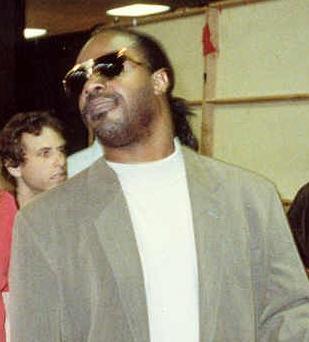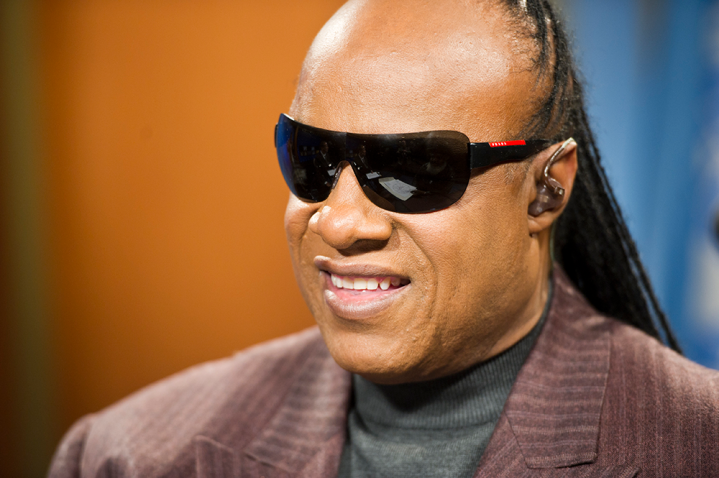Stevie Wonder
Stevie Wonder

Stevie Wonder, born Stevland Hardaway Morris (né Judkins) on May 13, 1950, is an American singer-songwriter, musician, and record producer. He is widely credited as a pioneer and influential figure in various musical genres, including R&B, pop, soul, gospel, funk, and jazz. Remarkably talented, Wonder is known for his versatility and unique contributions to the music industry.
Blind since shortly after birth, Wonder displayed prodigious musical talent from an early age. He signed with Motown's Tamla label at the remarkable age of 11, being given the professional name "Little Stevie Wonder." His early career showcased his skills as a multi-instrumentalist and performer, earning him success as a child prodigy.
During the 1970s, Stevie Wonder played a crucial role in reshaping the conventions of contemporary R&B. He became a virtual one-man band, incorporating synthesizers and other electronic musical instruments into his work. His influence extended beyond musical innovation, as he also played a key role in driving R&B and other genres into the album era. Wonder crafted his LPs with a focus on cohesion and consistency, often using them as platforms for socially conscious statements with complex compositions.
Stevie Wonder's enduring impact on the music industry is evident in his numerous achievements and accolades. His career spans decades, and he remains celebrated for his exceptional musical contributions.
Stevie Wonder's early success was marked by his single "Fingertips," which became a No. 1 hit on the Billboard Hot 100 in 1963 when he was just 13 years old. This achievement made him the youngest artist ever to top the chart, showcasing his extraordinary talent from a very young age.
Wonder's critical acclaim reached its pinnacle in the 1970s during what is often referred to as his "classic period." This era began in 1972 with the release of "Music of My Mind" and continued with "Talking Book," featuring the iconic "Superstition," which prominently showcased the sound of the Hohner Clavinet keyboard. His albums "Innervisions" (1973), "Fulfillingness' First Finale" (1974), and "Songs in the Key of Life" (1976) all won the Grammy Award for Album of the Year. This achievement tied him as the record holder for the most Album of the Year wins, with three. Notably, he is the only artist to have won the award with three consecutive album releases.
Transitioning to his "commercial period" in the 1980s, Stevie Wonder achieved even greater success. This period was characterized by his biggest hits, heightened levels of fame, increased album sales, active involvement in charity work, high-profile collaborations with artists like Paul McCartney and Michael Jackson, political impact, and numerous television appearances. Despite facing challenges, including being blind from early childhood, Stevie Wonder continued to remain active in both music and political causes, solidifying his status as a legendary figure in the entertainment industry.
Stevie Wonder stands among the best-selling music artists of all time, with a remarkable record of over 100 million records sold worldwide. His impact on the music industry is reflected in his collection of accolades, including 25 Grammy Awards, making him the solo artist with the most Grammy wins. Additionally, he received an Academy Award for Best Original Song for his work on the 1984 film "The Woman in Red."
Stevie Wonder's influence extends beyond music, and he has been duly recognized for his contributions. He has been inducted into prestigious institutions such as the Rhythm and Blues Music Hall of Fame, Rock and Roll Hall of Fame, and Songwriters Hall of Fame. Beyond his musical achievements, Wonder is renowned for his activism in support of various political causes. Notably, he played a pivotal role in the successful 1980 campaign to establish Martin Luther King Jr.'s birthday as a federal holiday in the United States.
In acknowledgment of his commitment to promoting peace and humanitarian efforts, Stevie Wonder was appointed a United Nations Messenger of Peace in 2009. Furthermore, in 2014, he received the Presidential Medal of Freedom, one of the highest honors bestowed upon civilians in the United States. Stevie Wonder's multifaceted career encompasses not only his musical prowess but also his impactful contributions to social and political causes.
Stevie Wonder, originally named Stevland Hardaway Judkins, was born on May 13, 1950, in Saginaw, Michigan. He was the third of five children born to Lula Mae Hardaway and the second child of Lula Mae with Calvin Judkins. Wonder was born prematurely, six weeks before his due date, and his early arrival, combined with the oxygen-rich environment in the hospital incubator, led to retinopathy of prematurity. This condition hindered eye growth, often causing retinal detachment and resulting in his blindness.
At the age of four, Stevie's parents divorced, and he moved with his mother and siblings to Detroit. Growing up in Detroit, he attended Whitestone Baptist Church, where he joined the choir and became a soloist at the young age of eight. Stevie's mother later resumed her relationship with her first child's father, who coincidentally shared the surname Hardaway, and reverted to her former name, Lula Hardaway. Stevie, showing an early interest in music, began playing various instruments such as the piano, harmonica, and drums. He formed a singing duo called "Stevie and John" with a friend, performing on street corners and at parties.
Upon signing with Motown in 1961, Stevie's surname was legally changed to Morris, an old family name. Berry Gordy, the founder of Motown, played a role in creating the stage name "Little Stevie Wonder" for the young artist. After the release of his debut album, "The Jazz Soul of Little Stevie" in 1962, he enrolled in the Michigan School for the Blind in Lansing, Michigan.
In 1961, at the age of 11, Stevie Wonder performed his original composition "Lonely Boy" for Ronnie White of the Miracles. Impressed by his talent, White took Wonder and his mother to an audition at Motown. Following the audition, Motown CEO Berry Gordy recognized Wonder's potential and signed him to Motown's Tamla label. Before officially signing, the label's producer Clarence Paul bestowed upon him the name "Little Stevie Wonder.":max_bytes(150000):strip_icc():focal(399x0:401x2):format(webp)/stevie-wonder-800-97742b2850ae4f6f92e8d1950857800e.jpg)
Given Wonder's young age, Motown devised a unique contract: a rolling five-year agreement where royalties would be held in trust until Wonder turned 21. During this period, he and his mother would receive a weekly stipend to cover their expenses. Wonder received $2.50 per week, and the label provided a private tutor for him while on tour. This arrangement aimed to protect Wonder's interests and financial well-being throughout his early career.:max_bytes(150000):strip_icc():focal(689x309:691x311):format(webp)/Stevie-Wonder_02-cd2bb80777e94a58b0c4d58e667e6540.jpg)
Upon signing with Motown, Stevie Wonder was placed under the guidance of producer and songwriter Clarence Paul. Over the course of a year, they collaborated on two albums. The first, "Tribute to Uncle Ray," was recorded when Wonder was just 11 years old. This album primarily featured covers of Ray Charles's songs and included a composition by Wonder and Paul titled "Sunset.":max_bytes(150000):strip_icc():focal(749x0:751x2):format(webp)/smoke-robinson-motown-e31acecb751f486fbda5ed87c2fafaed.jpg)
The second album, titled "The Jazz Soul of Little Stevie," was an instrumental album consisting mainly of compositions by Clarence Paul. Two tracks, "Wondering" and "Session Number 112," were co-written by Wonder and Paul. As they felt Wonder was now ready for a vocal release, they recorded a song titled "Mother Thank You" for a single. However, it was later replaced by Berry Gordy's composition "I Call It Pretty Music, But the Old People Call It the Blues" as Wonder's debut single. Released in the summer of 1962, the single nearly entered the Billboard Hot 100, reaching number 101 for one week in August. Two subsequent singles, "Little Water Boy" and "Contract on Love," experienced little success. The two albums, released in reverse order of recording, also met with limited success — "The Jazz Soul of Little Stevie" in September 1962 and "Tribute to Uncle Ray" in October 1962.:max_bytes(150000):strip_icc():focal(329x0:331x2):format(webp)/stevie-wonder-660-4-8a26514d8bfa4ad5aa4f5e4e59656abd.jpg)
At the end of 1962, Stevie Wonder, then 12 years old, joined the Motortown Revue, a tour of theaters across America that catered to black artists and was part of the "Chitlin' Circuit." During a performance at the Regal Theater in Chicago, his 20-minute set was recorded and later released in May 1963 as the album "Recorded Live: The 12 Year Old Genius." A single from the album, "Fingertips," was also released in May and became a major hit.:max_bytes(150000):strip_icc():focal(999x0:1001x2):format(webp)/little-richard-7-b5d4b4f63a894163b1041f9dac0a557d.jpg)
"Fingertips" featured a confident and enthusiastic Wonder returning for a spontaneous encore, catching the replacement bass player off guard. The bass player is heard calling out, "What key? What key?" The song became a No. 1 hit on the Billboard Hot 100 when Wonder was just 13 years old, making him the youngest artist ever to top the chart. Additionally, the single reached No. 1 on the R&B chart, marking the first time this had occurred.:max_bytes(150000):strip_icc():focal(749x0:751x2):format(webp)/Stevie-Wonder-b9e662e3007e4f6c9c34da8162688b59.jpg)
However, Wonder's subsequent recordings were not as successful. His voice was undergoing changes as he entered adolescence, and some executives at Motown were considering canceling his recording contract. In 1964, Wonder appeared in two films, "Muscle Beach Party" and "Bikini Beach," playing himself, but these ventures were not successful. It was Sylvia Moy, a songwriter and producer, who persuaded Motown founder Berry Gordy to give Wonder another chance.:max_bytes(150000):strip_icc():focal(719x309:721x311):format(webp)/Stevie-Wonder_03-b39d1421280a4232b8f558a4b5cae724.jpg)
After dropping the "Little" from his name, Stevie Wonder, along with Sylvia Moy, collaborated on creating the hit song "Uptight (Everything's Alright)." This marked the beginning of a successful period for Wonder in the mid-1960s. He went on to release several hits during this time, including "With a Child's Heart" and a cover of Bob Dylan's "Blowin' in the Wind." The latter was a duet with his mentor and producer, Clarence Paul.:max_bytes(150000):strip_icc():focal(749x239:751x241):format(webp)/Stevie-Wonder_13-0d6ecfb950164a9a8148eb51eab95a6e.jpg)
In addition to his solo career, Wonder started working in the Motown songwriting department. He composed songs for both himself and fellow label mates. One notable example is "The Tears of a Clown," a song that became a No. 1 hit for Smokey Robinson and the Miracles. Originally released in 1967 on their "Make It Happen" LP, it gained major success when re-released as a single in 1970. The success prompted Smokey Robinson to reconsider his decision to leave the group.:max_bytes(150000):strip_icc():focal(999x0:1001x2):format(webp)/lionel-richie-8-9200b6f809534159a2994d68e2f2b2e3.jpg)
In 1968, Stevie Wonder recorded an album of instrumental soul/jazz tracks titled "Eivets Rednow," where the title is "Stevie Wonder" spelled backward. The album featured mostly harmonica solos but did not receive much attention. The single from the album, a cover of Burt Bacharach's and Hal David's "Alfie," reached number 66 on the U.S. Pop charts and number 11 on the US Adult Contemporary charts.:max_bytes(150000):strip_icc():focal(734x319:736x321):format(webp)/Stevie-Wonder_08-04d0cb3bd4294b7dabbe1d2907147f7a.jpg)
Despite the reception of "Eivets Rednow," Wonder continued to achieve several hits between 1967 and 1970. Some of these hits included "I Was Made to Love Her," "For Once in My Life," and "Signed, Sealed, Delivered I'm Yours." Notably, "Signed, Sealed, Delivered I'm Yours" was his first self-produced song.:max_bytes(150000):strip_icc():focal(824x369:826x371):format(webp)/Stevie-Wonder_06-25edd0947bf84f16b86baaf0adbc3372.jpg)
During this period, many of Wonder's early hits, such as "My Cherie Amour," "I Was Made to Love Her," and "Uptight (Everything's Alright)," were co-written with Henry Cosby. In 1969, Wonder participated in the Sanremo Music Festival with the song "Se tu ragazza mia," in collaboration with Gabriella Ferri. Additionally, between 1967 and 1970, he recorded four 45 rpm singles and an Italian LP.
Stevie Wonder's performance at the 1969 Harlem Cultural Festival is featured in the 2021 music documentary "Summer of Soul," where he plays a drum solo during his set.:max_bytes(150000):strip_icc():focal(749x209:751x211):format(webp)/Stevie-Wonder_04-76b4df01da1e42c289f5eec5590c7dd7.jpg)
References
- Snapes, Laura (July 8, 2019). "Stevie Wonder to undergo kidney transplant". The Guardian. London. Retrieved July 26, 2020.
- ^ Smith, Giles (March 5, 1995). "The Enduring Otherworldliness of Stevie Wonder". The New Yorker. Retrieved July 26, 2020.
- ^ Keens, Oliver (June 29, 2016). "The best Stevie Wonder songs". Time Out. Retrieved July 26, 2020.
- ^ "Soul legend Stevie Wonder remembered". Daily News Egypt. May 18, 2020. Retrieved July 27, 2020.
- ^ Hoard, Christian; Brackett, Nathan, eds. (2004). The New Rolling Stone Album Guide. Simon & Schuster. p. 524. ISBN 9780743201698.^
- a b Love, Dennis; Brown, Stacy (2007). Blind Faith: The Miraculous Journey of Lula Hardaway, Stevie Wonder's Mother. Simon & Schuster. ISBN 978-1-4165-7785-0.
- a b Ribowski, Mark (2010). Signed, Sealed, and Delivered: The Soulful Journey of Stevie Wonder. Hoboken, NJ: John Wiley & Sons, Inc. Hardaway had her first child, Stevie's half-brother Milton, prior to her relationship with Judkins; following her split with Judkins, she rekindled her relationship with Milton's father, coincidentally named Paul Hardaway, who by now had another child of his own – Stevie's stepbrother Larry – and with whom she went on to have two more children, Stevie's half-sister Renee and half-brother Timmy


































